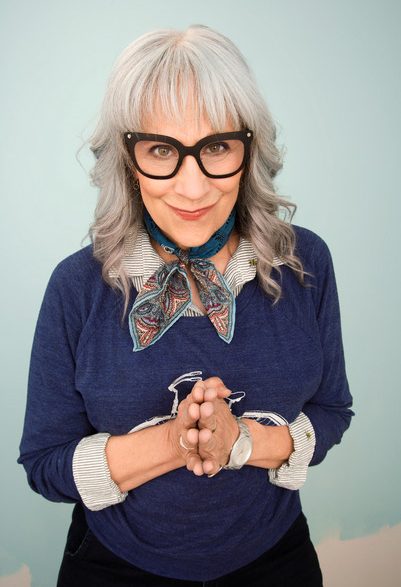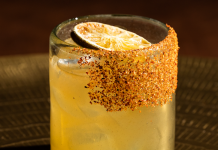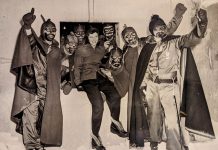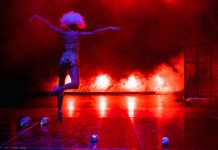
Photo by Mindy Tucker
At the end of December, Minneapolis tradition holds that comedian and political satirist Lizz Winstead shall cleanse us of the past year’s debacles and absurdities—by helping us laugh about them. “Every year, I say this is the hardest year ever. And every year, it is,” she says during a phone interview, about putting the annual show together. “And this year is no exception.”
Over 10-plus years, Winstead’s New Year’s stand-up set, taking place this year Wed.-Fri., Dec. 29-31, at the Cedar Cultural Center, has become a dependable denouement for Twin Citians in the know. And it has persisted. Last year, amid unusual circumstances, she delivered her “comedy purge” unto 20 people floating in kayaks. She did another night in the woods, in 19 degrees, for folks around fire pits. The show was called Corona Borealis.
This year’s iteration, called Bang the Dumb Slowly, marks a return to form in more ways than one. Throughout the past year, Winstead has done only a few live shows, she says, while also leading the Abortion Access Front, a team of comedians, writers, and producers who deploy humor across the country to destigmatize abortion and raise awareness of related issues. (A weekly web series just launched on YouTube.)
She cancelled gigs at venues that didn’t impose vaccine mandates, mask requirements, and tight COVID protocols. “The Cedar is also really committed to that,” she says, noting a strong decade-long relationship with the venue. As an aside, she adds, “Listening to some of the anti-vax or rage-y comedians out there—if I was somebody who was like, ‘These mandates are ruining [things] for people!,’ I can sell out stadiums, apparently.”
This cool perspective characterizes Winstead’s approach. If it feels as though the years are piling up to greater and greater alarm, Winstead maintains her withering gaze. In fact, it’s tempting to see her as a mythic local figure who manifests at year’s end to sharpen our vision of what was. After all, the Minneapolis-raised comedian, who splits her time between Minneapolis and New York City, has been doing this since the aughts. She recalls starting with a review of Obama’s first 100 days in office. By then, she had established herself in political satire, having co-founded and served as head writer for The Daily Show. (A recent Los Angeles Times story describes Winstead’s and Madeleine Smithberg’s work in co-creating the parody newscast as culturally “erased,” and the two came together for a 25-year reunion this past summer.)
Her year-kicking shows employ an impressive methodology. “I have a whole information consumption system,” Winstead says—one that involves waking at 5:30 a.m., reading the news, devouring the cable networks (Fox, CNN, MSNBC), and checking the columns of her TweetDeck to learn what journalists, influencers, and thinkers have to say about healthcare, the environment, education, and other subjects.
Then, she tests jokes on Twitter. If one gets 25 retweets in less than a minute, “that counts as a laugh.” It goes into her writing docket, alphabetized by topic. The material runs deeper than your standard-issue late-night monologue fodder. Ever since “Trump jokes” became a thing, she observes, comedians have generally fancied themselves political humorists. “For me, floating an idea out—it’s not just, ‘This news story happened, here’s a joke about it,’ ” she says. “It’s, ‘What are the patterns I’m seeing? What are some wild hypotheses that I might have created for patterns that I’ve seen?’ ”
By the time the year is up, Winstead has a rich catalog of takes—“and I start sobbing because it’s 65 pages long.” How to cut it down to 75 minutes? “Yikes.” Will people be disappointed if she doesn’t mention this one thing, or that? “I often just say, you know, think of the year like Springsteen or the Rolling Stones. I can’t get to everything. There’s a lot of hits.”
She offers a preview of this year’s hit parade, in short-but-long order: the insurrection (“woefully erased from the memories of the GOP”), cancel culture (“The hypocrisy of going on Saturday Night Light or having a Netflix special and saying you’re canceled is very rich to me”), the allergic reaction those in power seem to have to culpability (“We just had the leader of the Republican Party blame the Biden administration for this woeful vaccine rollout, and it’s like—you have denied it; you tell people not to get it, not to wear masks”), the close-to-home subjects of George Floyd, Daunte Wright, and racial justice (“You know how everybody wanted to just buy a bunch of books on anti-Blackness instead of actually meeting a Black person and having relationships with people of color?”), plus anti-vaxxers, the media’s role in pushing conspiracy theories, and, in general, “what we’ve all gone through together and how we’ve managed it.”
The outlook is liberal, but Winstead points out that it’s also fact-checked, and she spares none—was quick to challenge Obama on drone policies, on Tim Geithner, on Syria. “Administrations come and go.” And to those who might cavil at her evident left-wing bent: “You never want to walk into a butcher shop and go, ‘Why don’t you sell fish here?’ ”
She’s also eager to return to her familiar at-home audience. Before The Daily Show, Winstead toured as a comedian in her 20s, and before that, she got her start doing the open mics at Brave New Workshop in 1983. She grew up in south Minneapolis, attending Southwest High School. “It really can’t go unmentioned that Scott Hansen passed away this year,” Winstead says. “He really was the person who created the stand-up scene in Minnesota.”
The New Year’s set marks what she calls her yearly highlight. “I’m thrilled that folks in the Twin Cities pile out for it, and they really feel like it’s a really grand exhale to a year behind them,” she says.
An exhale, yes—but has the show felt more overwhelming than in years past, given, well, everything? “I think [the pandemic] shone a light on our vulnerabilities,” she says. “And I think that brought out the worst in humanity.”
Later, she adds, “For me, it’s been different in the sense that we used to have a terra firma, where there was baseline of humanity—that no matter what your political affiliation was, we all kind of believed it. And I think that humanity has been put up for debate now. And that feels really weird.”
Buy tickets to Bang the Dumb Slowly at the Cedar Cultural Center, Dec. 29-31, here.






